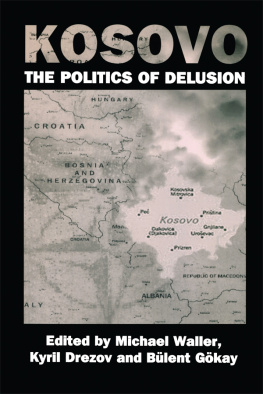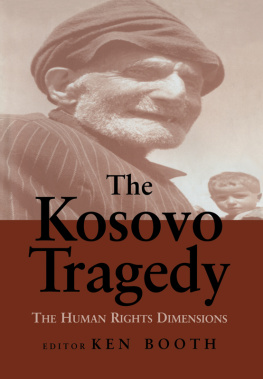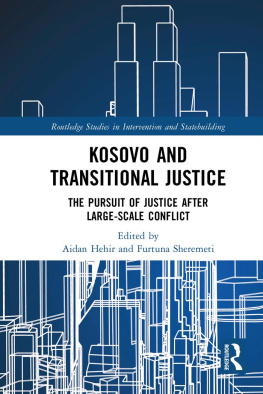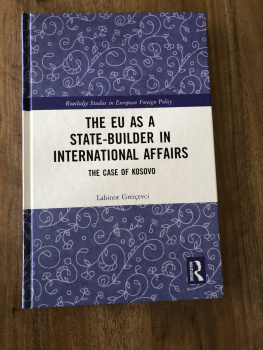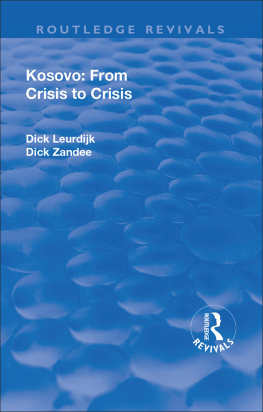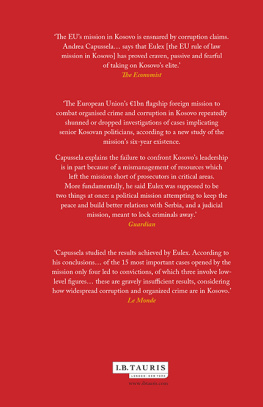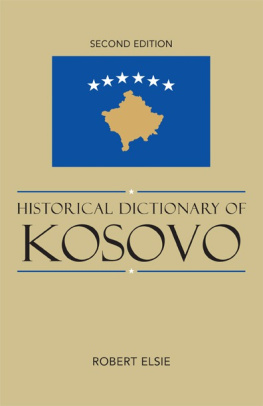Gökay - Kosovo: the Politics of Delusion
Here you can read online Gökay - Kosovo: the Politics of Delusion full text of the book (entire story) in english for free. Download pdf and epub, get meaning, cover and reviews about this ebook. City: New York;Abingdon;Oxon;Kosovo (Republic);Serbia, year: 2013, publisher: Taylor & Francis (CAM);Routledge, genre: Politics. Description of the work, (preface) as well as reviews are available. Best literature library LitArk.com created for fans of good reading and offers a wide selection of genres:
Romance novel
Science fiction
Adventure
Detective
Science
History
Home and family
Prose
Art
Politics
Computer
Non-fiction
Religion
Business
Children
Humor
Choose a favorite category and find really read worthwhile books. Enjoy immersion in the world of imagination, feel the emotions of the characters or learn something new for yourself, make an fascinating discovery.
Kosovo: the Politics of Delusion: summary, description and annotation
We offer to read an annotation, description, summary or preface (depends on what the author of the book "Kosovo: the Politics of Delusion" wrote himself). If you haven't found the necessary information about the book — write in the comments, we will try to find it.
Gökay: author's other books
Who wrote Kosovo: the Politics of Delusion? Find out the surname, the name of the author of the book and a list of all author's works by series.
Kosovo: the Politics of Delusion — read online for free the complete book (whole text) full work
Below is the text of the book, divided by pages. System saving the place of the last page read, allows you to conveniently read the book "Kosovo: the Politics of Delusion" online for free, without having to search again every time where you left off. Put a bookmark, and you can go to the page where you finished reading at any time.
Font size:
Interval:
Bookmark:
Kosovo:
The Politics of Delusion
There really was, it seemed, a nation on this earth prepared to fight for the freedom of other men, and to fight at her own expense, and at the cost of hardship and peril to herself; a nation prepared to do this service not just for her near neighbours, for those in her part of the world, for lands geographically connected with her own, but even prepared to cross the sea in order to prevent the establishment of an unjust dominion in any quarter of the globe, and to ensure that right and justice, and the rule of law, should everywhere be supreme.
Livy (Titus Livius, 59BCAD17), The History of Rome from its Foundation, XXXIII-33 (Harmondsworth: Penguin, 1976), p. 127 on the reaction of the Greeks to the Roman victory over their former Macedonian overlords.
If men were all virtuous, returned the artist, I should with great alacrity teach them all to fly. But what would be the security of the good, if the bad could at pleasure invade them from the sky? Against an army sailing through the clouds, neither walls, nor mountains, nor seas, could afford any security. A flight of northern savages might hover in the wind, and light at once with irresistible force upon the capital of a fruitful region that was rolling under them.
Doctor Johnson, The History of Rasselas, Prince of Abyssinia, first published in 1759 (Shorter Novels, Eighteenth Century, Everyman, 1930, p. 14).
Kosovo:
The Politics of Delusion
Edited by
MICHAEL WALLER, KYRIL DREZOV
and BLENT GKAY

First published in 2001 by
FRANK CASS PUBLISHERS
This edition published 2013 by Routledge
2 Park Square, Milton Park, Abingdon, Oxon, OX14 4RN
711 Third Avenue, New York, NY 10017
Routledge is an imprint of the Taylor & Francis Group, an informa business
Copyright of collection 2001 Frank Cass & Co. Ltd
Copyright of chapters 2001 contributors
British Library Cataloguing in Publication Data
Kosovo: the politics of delusion
1. Operation Allied Force, 1999 Evaluation 2. Security,
International 3. Intervention (International law) 4. Kosovo
(Serbia) History Civil War, 1998- 5. Kosovo (Serbia)
Politics and government 1980- 6. Yugoslavia Foreign
relations 1992
I. Waller, Michael, 1934- II. Drezov, Kyril III. Gokay, Bulent
949.7103
ISBN 978-0-7146-5157-6 (hbk)
Library of Congress Cataloging-in-Publication Data
Kosovo/ edited by Michael Waller, Kyril Drezov, and Blent Gkay.
p. cm.
Includes bibliographical references and index.
ISBN 0-7146-5157-5 (hbk)
1. Kosovo (Serbia)-History-Civil War, 1998- 2. North Atlantic Treaty Organization.
I. Waller, Michael, 1934- II. Drezov, Kyril. III. Gkay, Blent.
DR2087.K664 2001
949.7103-dc21
2001017197
All rights reserved. No part of this publication may be reproduced, stored in or introduced into a retrieval system or transmitted in any form or by any means, electronic, mechanical, photocopying, recording or otherwise, without the prior written permission of the publisher of this book.
Typeset in 10.5/12 pt Baskerville by Vitaset, Paddock Wood, Kent.
Contents
Kosovo/Kosova: A Land of Conflicting Myths
Aleksandar Pavkovi
Albanian Schooling in Kosovo 19921998: Liberty Imprisoned
Denisa Kostoviov
The Growing Pains of the Kosovo Liberation Army
Tim Judah
The Kosovo Liberation Army: The Myth of Origin
James Pettifer
Tiranas Uneasy Role in the Kosovo Crisis, 19981999
Miranda Vickers
Kosovar Refugees in Albania: The Emergency Response
Alba Bozo
Come, friendly bombs : International Law in Kosovo
Patrick Thornberry
Collateral Damage: The Impact on Macedonia of the Kosovo War
Kyril Drezov
Kosovized Bosnia
Zoran irjakovi
Bombing Yugoslavia: It Is Simply the Wrong Thing to Do
Kyril Drezov and Blent Gkay
Should NATO Bomb Serbia?
Christopher Brewin
Looking Neither Forward Nor Back: NATOs Balkan Adventure
Andrew Fear
Gardening
Alex Danchev
Rational Means to Useful Ends
Michael Waller
Kosovo: Why Intervention was Right
Matthew Wyman
So Much Expended for So Little Good
John Sloboda
Lessons of Kosovo
Martin Dent
The Limitations of Violent Intervention
Sofia Damm
The Natural Environment and the Balkan Conflict
Andrew Dobson
On the night of 24 March 1999, NATO forces started their air offensive against Yugoslavia. The bombing of Yugoslavia continued until 10 June lasting 79 days, with 1,200 aircraft dropping around 20,000 bombs and hundreds of missiles from a height of 15,000 feet. According to NATO estimates made during the campaign, around 5,000 members of the Yugoslav armed forces were killed and hundreds of their tanks and heavy guns were destroyed in Kosovo; in the meantime about 1.4 million Kosovo Albanians were forced from their homes 500,000 were allegedly displaced inside Kosovo, and 850,000 fled to the neighbouring countries; 100,000 Albanian men were reported missing, presumably killed by the Serbs. The picture that emerged after the end of the bombing looked somewhat different: in Kosovo NATOs bombing had destroyed 13 tanks and killed about 400 Serbian soldiers (an equal number had been killed by the Kosovo Liberation Army), throughout Yugoslavia anywhere between 500 and 1,400 civilians were killed by NATO bombs a collateral damage that could be three times higher than the Serbian military casualties; some 2,000 Kosovo Albanians both KLA fighters and civilians were killed by Serbian forces after the beginning of the air campaign. NATOs takeover of Kosovo in mid-June changed the refugee statistics as well: half of the 850,000 refugees outside the province returned to Kosovo by the end of June, the expected half a million internally displaced Albanians did not materialize, and about 100,000 Serbian refugees (half of the local Serbian population) fled or were evicted from Kosovo.
Why did Kosovo become the focal point of NATOs undeclared war against Yugoslavia? The American-inspired international community, with NATO as its military arm, is the next in a long succession of outside powers the Roman Empire, the Ottoman Empire, the Habsburg Empire, the Soviet empire to impose order on the Balkans. In 1995 NATO acquired its first Balkan protectorate in Bosnia, following a clash with Slobodan Miloevi and the forces of Serbian nationalism under his control. Routine human rights violations, escalating violence, irreconcilable claims and danger of a spill-over into neighbouring states, made Kosovo the natural candidate for another NATO involvement in the Balkans.
For centuries Serbs and Albanians have inhabited Kosovo, and from the nineteenth century it became the centre of competing claims and ethnic strife. For the Serbs, Kosovo is the heartland of the medieval Serbian kingdom where many of the important monuments of the Serbian Orthodox Church are situated. And for the Albanians, Kosovo is the cradle of their struggle for independence, the place where the Prizren League was founded in 1878.
Over the centuries administrative power in Kosovo changed hands many times between Serbs and Albanians, Christians and Muslims. Domination of one ethnic group over another emerged as a defining feature of Serb-Albanian relations in Kosovo, whether during the Ottoman period, the world wars or under communism.
Under Tito and his successors Kosovo was the poorest and most volatile part of the Socialist Federal Republic of Yugoslavia. The period of Serbian control and repression under security police chief Aleksandar Rankovi (194566), was followed by a period of Albanian domination (196789). According to the 1974 constitution Kosovo enjoyed a quasi-republican status within Yugoslavia, although it remained formally an autonomous province of Serbia. Albanian demonstrations for full republican status within Yugoslavia were suppressed by federal troops in 1981, and relations between Serbs and Albanians in Kosovo took a turn for the worse. In the late 1980s the Serbian leadership under Milosevic discarded the rhetoric of communism and embraced the hitherto dissident ideas of Serbian nationalism in particular the call for the restoration of full Serbian sovereignty over Kosovo. In this way the Serbian communists managed to keep power and prevented the emergence of genuine opposition to their rule. Kosovo was just a pawn in this power game. The Serbs had already lost effective control of Kosovo due to the demographic preponderance of the Kosovo Albanians. However, the adoption of the traditional Serb obsession with Kosovo as Milosevics official policy implied that Kosovo should be kept at all costs. In 1989 the autonomy enshrined in the 1974 constitution was severely curtailed, and full Serbian control over Kosovo was re-established.
Next pageFont size:
Interval:
Bookmark:
Similar books «Kosovo: the Politics of Delusion»
Look at similar books to Kosovo: the Politics of Delusion. We have selected literature similar in name and meaning in the hope of providing readers with more options to find new, interesting, not yet read works.
Discussion, reviews of the book Kosovo: the Politics of Delusion and just readers' own opinions. Leave your comments, write what you think about the work, its meaning or the main characters. Specify what exactly you liked and what you didn't like, and why you think so.

